介子推与清明节英语故事
清明节英文介绍
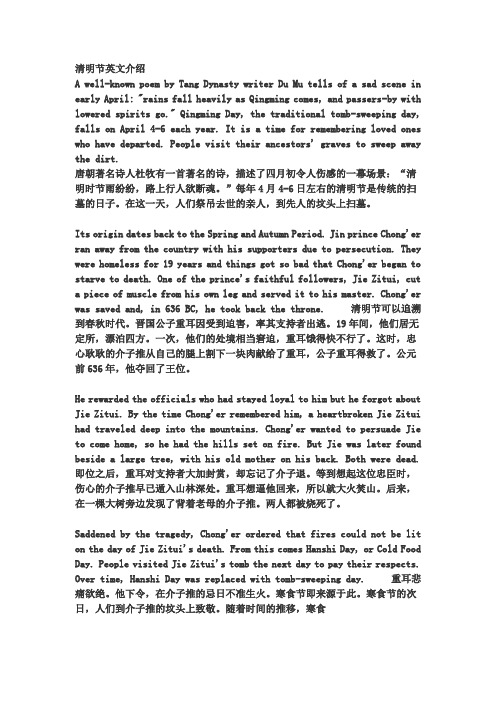
清明节英文介绍A well-known poem by Tang Dynasty writer Du Mu tells of a sad scene in early April: "rains fall heavily as Qingming comes, and passers-by with lowered spirits go." Qingming Day, the traditional tomb-sweeping day, falls on April 4-6 each year. It is a time for remembering loved ones who have departed. People visit their ancestors' graves to sweep awaythe dirt.唐朝著名诗人杜牧有一首著名的诗,描述了四月初令人伤感的一幕场景:“清明时节雨纷纷,路上行人欲断魂。
”每年4月4-6日左右的清明节是传统的扫墓的日子。
在这一天,人们祭吊去世的亲人,到先人的坟头上扫墓。
Its origin dates back to the Spring and Autumn Period. Jin prince Chong'erran away from the country with his supporters due to persecution. They were homeless for 19 years and things got so bad that Chong'er began to starve to death. One of the prince's faithful followers, Jie Zitui, cuta piece of muscle from his own leg and served it to his master. Chong'er was saved and, in 636 BC, he took back the throne. 清明节可以追溯到春秋时代。
清明节的习俗英文

清明节的习俗英文he rewarded the officials who had stayed loyal to him but he forgot about jie zitui. by the time chonger remembered him, a heartbroken jie zitui had traveled deep into the mountains. chonger wanted to persuade jie to come home, so he had the hills set on fire. but jie was later found beside a large tree, with his old mother on his back. both were dead. 即位之后,重耳对支持者大加封赏,却忘记了介子退。
等到想起这位忠臣时,伤心的介子推早已遁入山林深处。
重耳想逼他回来,所以就大火焚山。
后来,在一棵大树旁边发现了背着老母的介子推。
两人都被烧死了。
saddened by the tragedy, chonger ordered that fires could not be lit on the day of jie zituis death. from this comes hanshi day, or cold food day. people visited jie zituis tomb the next day to pay their respects. over time, hanshi day was replaced with tomb-sweeping day. 重耳悲痛欲绝。
他下令,在介子推的忌日不准生火。
寒食节即来源于此。
寒食节的次日,人们到介子推的坟头上致敬。
随着时间的推移,寒食tomb-sweeping day 清明节英文介绍tomb-sweeping day是最常用的pure bright festival 清明节另外的说法:qingming festival(清明节英语介绍)the qingming (pure brightness) festival is one of the 24 seasonal division points in china, falling on april 4-6 each year. after the festival, the temperature will rise up and rainfall increases. it is the high time for spring plowing and sowing. but the qingming festival is not only a seasonal point to guide farm work, it is more a festival ofcommemoration.the qingming festival sees a combination of sadness and happiness.this is the most important day of sacrifice. both the han and minority ethnic groups at this time offer sacrifices to their ancestors and sweep the tombs of the diseased. also, they will not cook on this day and only cold food is served.the hanshi (cold food) festival was usually one day before the qingming festival. as our ancestors often extended the day to the qingming, they were later combined.on each qingming festival, all cemeteries are crowded with people who came to sweep tombs and offer sacrifices. traffic on the way to the cemeteries becomes extremely jammed. the customs have been greatly simplified today. after slightly sweeping the tombs, people offer food, flowers and favorites of the dead, then burn incense and paper money and bow before the memorial tablet.in contrast to the sadness of the tomb sweepers, people also enjoy hope of spring on this day. the qingming festival is a time when the sun shines brightly, the trees and grass become green and nature is again lively. since ancient times, people have followed the custom of spring outings. at this time tourists are everywhere.people love to fly kites during the qingming festival. kite flying is actually not limited to the qingming festival. its uniqueness lies in that people fly kites not during the day, but also at night.a string of little lanterns tied onto the kite or the thread look like shining stars, and therefore, are called gods lanterns.the qingming festival is also a time to plant trees, for the survival rate of saplings is high and trees grow fast later. in the past, theqingming festival was called arbor day. but since 1979, arbor day was settled as march 12 according to the gregorian calendar.清明节清明是我国的二十四节气之一。
清明节的由来(中英文解说)
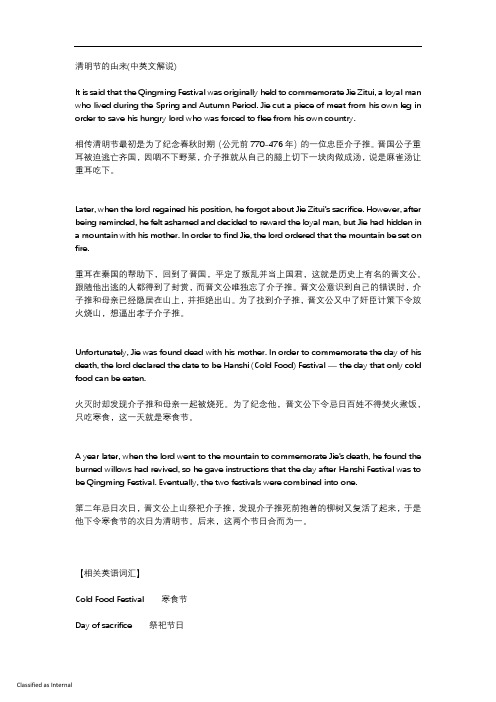
清明节的由来(中英文解说)It is said that the Qingming Festival was originally held to commemorate Jie Zitui, a loyal man who lived during the Spring and Autumn Period. Jie cut a piece of meat from his own leg in order to save his hungry lord who was forced to flee from his own country.相传清明节最初是为了纪念春秋时期(公元前770-476年)的一位忠臣介子推。
晋国公子重耳被迫逃亡齐国,因咽不下野菜,介子推就从自己的腿上切下一块肉做成汤,说是麻雀汤让重耳吃下。
Later, when the lord regained his position, he forgot about Jie Zitui’s sacrifice. However, after being reminded, he felt ashamed and decided to reward the loyal man, but Jie had hidden in a mountain with his mother. In order to find Jie, the lord ordered that the mountain be set on fire.重耳在秦国的帮助下,回到了晋国,平定了叛乱并当上国君,这就是历史上有名的晋文公。
跟随他出逃的人都得到了封赏,而晋文公唯独忘了介子推。
晋文公意识到自己的错误时,介子推和母亲已经隐居在山上,并拒绝出山。
为了找到介子推,晋文公又中了奸臣计策下令放火烧山,想逼出孝子介子推。
Unfortunately, Jie was found dead with his mother. In order to commemorate the day of his death, the lord declared the date to be Hanshi (Cold Food) Festival — the day that only cold food can be eaten.火灭时却发现介子推和母亲一起被烧死。
清明节的传说英语版
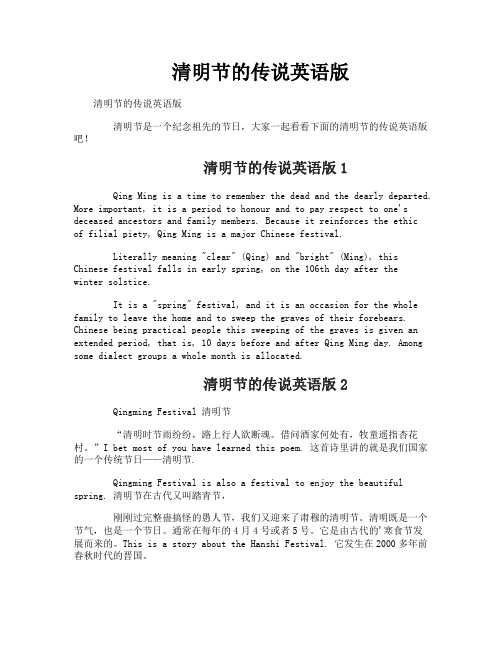
清明节的传说英语版清明节的传说英语版清明节是一个纪念祖先的节日,大家一起看看下面的清明节的传说英语版吧!清明节的传说英语版1Qing Ming is a time to remember the dead and the dearly departed. More important, it is a period to honour and to pay respect to one's deceased ancestors and family members. Because it reinforces the ethicof filial piety, Qing Ming is a major Chinese festival.Literally meaning "clear" (Qing) and "bright" (Ming), this Chinese festival falls in early spring, on the 106th day after thewinter solstice.It is a "spring" festival, and it is an occasion for the whole family to leave the home and to sweep the graves of their forebears. Chinese being practical people this sweeping of the graves is given an extended period, that is, 10 days before and after Qing Ming day. Among some dialect groups a whole month is allocated.清明节的传说英语版2Qingming Festival 清明节“清明时节雨纷纷,路上行人欲断魂。
关于清明节的由来英语作文8年级
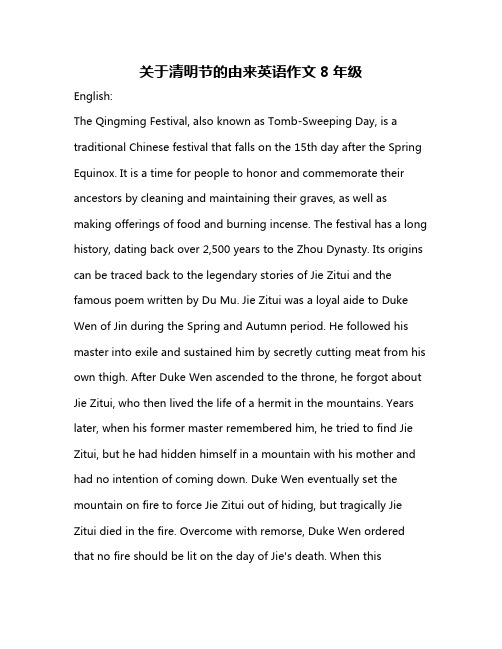
关于清明节的由来英语作文8年级English:The Qingming Festival, also known as Tomb-Sweeping Day, is a traditional Chinese festival that falls on the 15th day after the Spring Equinox. It is a time for people to honor and commemorate their ancestors by cleaning and maintaining their graves, as well as making offerings of food and burning incense. The festival has a long history, dating back over 2,500 years to the Zhou Dynasty. Its origins can be traced back to the legendary stories of Jie Zitui and the famous poem written by Du Mu. Jie Zitui was a loyal aide to Duke Wen of Jin during the Spring and Autumn period. He followed his master into exile and sustained him by secretly cutting meat from his own thigh. After Duke Wen ascended to the throne, he forgot about Jie Zitui, who then lived the life of a hermit in the mountains. Years later, when his former master remembered him, he tried to find Jie Zitui, but he had hidden himself in a mountain with his mother and had no intention of coming down. Duke Wen eventually set the mountain on fire to force Jie Zitui out of hiding, but tragically Jie Zitui died in the fire. Overcome with remorse, Duke Wen ordered that no fire should be lit on the day of Jie's death. When thishappened, he could not find Jie Zitui. Later he found his loyal aide and discovered that he and his mother were sustained only by wild vegetables. The Duke was so grieved by this and by Jie’s death that he ordered three days in his honor that no fire could be lit. This story eventually evolved into the Qingming Festival as we know it today.中文翻译:清明节,又称清明节,是中国的一个传统节日,是在春分后的第15天。
清明节的传说英语作文

清明节的传说英语作文English Response:The Qingming Festival, also known as the Tomb Sweeping Festival, is a traditional Chinese holiday that occurs annually on or around April 5th or 6th. It is a day when people visit the graves of their ancestors and pay respects to their departed loved ones. The festival has a long history, with its origins dating back more than 2,500 years.One of the most well-known legends associated with the Qingming Festival is the story of Jie Zitui. Jie Zitui wasa loyal follower of the Duke of Jin, Chong'er. During atime of exile, Chong'er and his followers were starving.Jie Zitui cut off a piece of his own thigh to feed his lord. When Chong'er eventually became king, he offered to reward Jie Zitui, but Jie refused and instead retreated to the mountains. In order to force Jie Zitui out of hiding,Chong'er ordered the mountains to be set on fire. However, Jie Zitui and his mother refused to leave the mountains andwere burned to death.In memory of Jie Zitui's sacrifice, Chong'er designated the day of their deaths as a day to sweep the tombs of ancestors and known as Qingming Festival. The festival was originally observed as a day of mourning, but over time it evolved into a day of family reunions and celebrations.Another legend associated with the Qingming Festival is the story of the Cold Food Festival. The Cold Food Festival is a three-day festival that occurs the week before the Qingming Festival. During the Cold Food Festival, people are not allowed to cook or eat hot food. This tradition is believed to have originated from a legend about a loyal minister named介子推(Jiè Zǐtuī).介子推(Jiè Zǐtuī) was a loyal follower of the Duke of Jin,Chong'er (重耳). When Chong'er was exiled from his kingdom, 介子推(Jiè Zǐtuī) followed him into exile and remained loyal to him throughout his many hardships.One day, when Chong'er and his followers were starving,介子推(Jiè Zǐtuī) cut off a piece of his own thigh to feed his lord. Chong'er was so moved by this act of loyalty that he vowed to reward 介子推(Jiè Zǐtuī) if he ever regained his kingdom.When Chong'er eventually regained his kingdom, heoffered to reward 介子推(Jiè Zǐtuī) with a highposition and a large fortune. However, 介子推(Jiè Zǐtuī) refused all of these rewards and instead asked to retire to the mountains.Chong'er was disappointed that 介子推(Jiè Zǐtuī)had refused his rewards, but he respected his wishes and allowed him to retire to the mountains. However, Chong'er never forgot the sacrifice that 介子推(Jiè Zǐtuī) had made for him.Every year, on the anniversary of the day that 介子推(Jiè Zǐtuī) cut off his thigh to feed Chong'er, Chong'er would order his people to not cook or eat hot food. Thisday became known as the Cold Food Festival.The Cold Food Festival is still observed in China today, and it is a reminder of the importance of loyalty and sacrifice.中文回答:清明节,又称扫墓节,是中国传统节日,每年公历4月5日或6日左右。
清明节故事英语作文80词
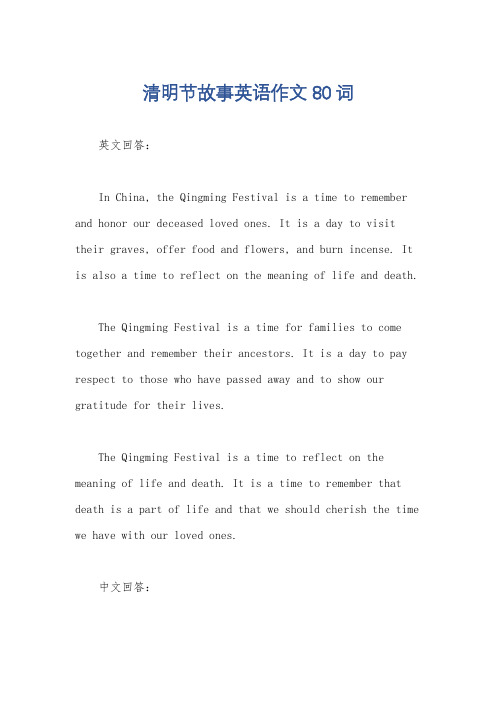
清明节故事英语作文80词英文回答:In China, the Qingming Festival is a time to remember and honor our deceased loved ones. It is a day to visit their graves, offer food and flowers, and burn incense. It is also a time to reflect on the meaning of life and death.The Qingming Festival is a time for families to come together and remember their ancestors. It is a day to pay respect to those who have passed away and to show our gratitude for their lives.The Qingming Festival is a time to reflect on the meaning of life and death. It is a time to remember that death is a part of life and that we should cherish the time we have with our loved ones.中文回答:清明节的故事。
清明节是中国重要的传统节日之一,也是一个祭奠逝者的节日。
在这天,人们会去扫墓,给故人献上鲜花和水果,并点燃香火。
清明节也是一个缅怀先人的日子,人们会通过各种方式来表达对逝者的思念和敬重。
清明节的由来。
清明节的起源可以追溯到两千多年前的春秋时期。
相传,当时晋国的大臣介子推跟随晋文公流亡在外,为了帮助文公复国,介子推割下自己大腿上的肉给文公充饥。
清明节起源作文英语带翻译
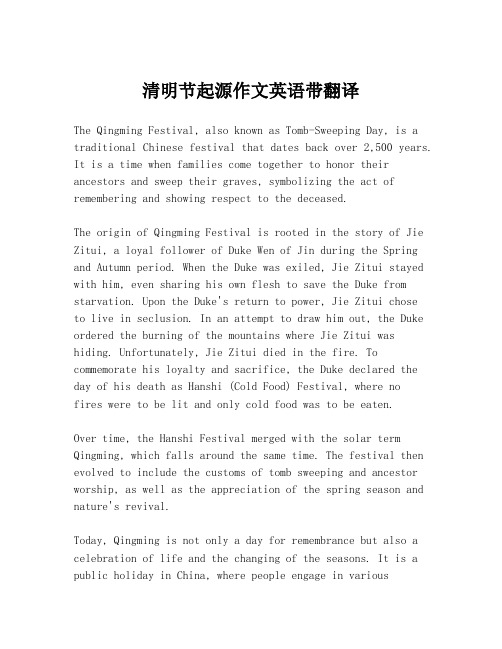
清明节起源作文英语带翻译The Qingming Festival, also known as Tomb-Sweeping Day, is a traditional Chinese festival that dates back over 2,500 years. It is a time when families come together to honor their ancestors and sweep their graves, symbolizing the act of remembering and showing respect to the deceased.The origin of Qingming Festival is rooted in the story of Jie Zitui, a loyal follower of Duke Wen of Jin during the Spring and Autumn period. When the Duke was exiled, Jie Zitui stayed with him, even sharing his own flesh to save the Duke from starvation. Upon the Duke's return to power, Jie Zitui choseto live in seclusion. In an attempt to draw him out, the Duke ordered the burning of the mountains where Jie Zitui was hiding. Unfortunately, Jie Zitui died in the fire. To commemorate his loyalty and sacrifice, the Duke declared the day of his death as Hanshi (Cold Food) Festival, where nofires were to be lit and only cold food was to be eaten.Over time, the Hanshi Festival merged with the solar term Qingming, which falls around the same time. The festival then evolved to include the customs of tomb sweeping and ancestor worship, as well as the appreciation of the spring season and nature's revival.Today, Qingming is not only a day for remembrance but also a celebration of life and the changing of the seasons. It is a public holiday in China, where people engage in variousactivities such as visiting cemeteries, offering food and drinks to the ancestors, and participating in cultural events.清明节的起源清明节,也被称为扫墓节,是一个有着2500多年历史的中国传统节日。
- 1、下载文档前请自行甄别文档内容的完整性,平台不提供额外的编辑、内容补充、找答案等附加服务。
- 2、"仅部分预览"的文档,不可在线预览部分如存在完整性等问题,可反馈申请退款(可完整预览的文档不适用该条件!)。
- 3、如文档侵犯您的权益,请联系客服反馈,我们会尽快为您处理(人工客服工作时间:9:00-18:30)。
介子推与清明节英语故事
介子推与清明节英语故事
The Qingming Festival is popularly associated with Jie Zitui, who lived in Shanxi province in 600
谈到清明节,有点历史知识的人,都会联想到历史人物介子推。
Legend has it that Jie saved his starving lord’s life by serving a piece of his own leg. When the lord succeeded in becoming the ruler of a small principality, he invited his faithful follower to join him.
据历史记载,在两千多年以前的春
秋时代,晋国公子重耳逃亡在外,生活艰苦,跟随他的介子推不惜从自己的腿上割下一块肉让他充饥。
However, Jie declined his invitation, preferri ng having a hermit’s life with his mother in the mountains.
后来,重耳回到晋国,作了国君(即晋文公,春秋五霸之一),大事封赏所有跟随他流亡在外的随从,惟独介子推拒绝接受封赏,他带了母亲隐居绵山。
Believing that he could force Jie out by burning the mountain, the lord ordered his men to set the forest on fire.
晋文公无计可施,只好放火烧山,他想,介子推孝顺母亲,一定会带着老母出来。
To his consternation, Jie chose to
remain in the mountain and was burnt to death. To commemorate Jie, the lord ordered all fires in every home to be put out on the anniversary of Jie’s death. Thus began the “cold food feast”, a day when no food could be cooked since no fire could be lit.
谁知这场大火却把介子推母子烧死了。
为了纪念介子推,晋文公下令每年的这一天,禁止生火,家家户户只能吃生冷的食物,这就是寒食节的来源。
The “cold food” festival occurs on the eve of the Qingming Festival and is often considered as part of it.
寒食节是在清明节的前一天,古人常把寒食节的活动延续到清明,久而久之,清明取代了寒食节。
As time passes, the Qingming
Festival replaced the “cold food” festival.
拜介子推的习俗也变成了清明扫墓的习俗了。
Whatever practice is observed,the basic observation of Qing Ming is to remember one’s elders by making a special effort to visit their graves, ashes or ancestral tablets. To make the visit even more meaningful, some time should be spent to let young generation of family members know ancestors’ past strugg les and contributions, and the story of Jie Zitui who chose death over capitulation.
无论以何种形式纪念,为了使纪念祖先的仪式更有意义,我们应该让年轻一代的家庭成员了解先人过去的奋斗历史,当然,还要学习介子推宁死不屈的气节。
